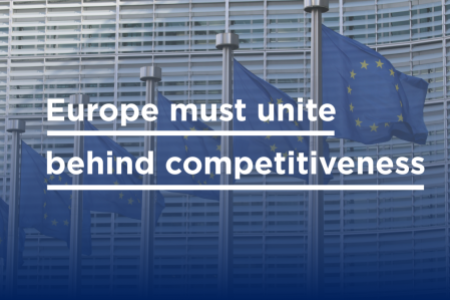You are here
State of the Union 2025: Europe must unite behind competitiveness
In her annual State of the Union address to the European Parliament, Commission President von der Leyen warned that, at a time of geopolitical rivalry, a new Europe must emerge.
Commenting on her remarks, Malte Lohan, CEO, the American Chamber of Commerce to the EU (AmCham EU), echoed the Commission President’s pitch for European unity and emphasised the critical role of the competitiveness agenda: ‘President von der Leyen captured the urgency of the moment: “Europe is in a fight”. But the EU will get nowhere in that fight without a competitive economy that generates investment, innovation and growth. The Commission has set the course; it is now for the Parliament and Member States to follow through and make competitiveness Europe’s defining strength’.

Frontloading competitiveness
Competitiveness was part of a long list of priorities President von der Leyen urged policymakers to advance. However, US businesses committed to Europe see stronger competitiveness as a precondition for realising the other priorities. Europe cannot address climate change, project strength on the global stage or tackle housing and poverty at home without an economy that is attractive for investment and allows companies to grow and be profitable – in the President’s words, an economy that supports jobs, people and livelihoods.
The announced Single Market Roadmap to 2028 is a positive signal that the Commission recognises the role a reformed, less fragmented Single Market must play in safeguarding the EU's prosperity. It remains the number one driver of foreign investment into Europe. Yet, as President von der Leyen noted, businesses operating across the EU face the equivalent of a 45% tariff on goods and a 110% tariff on services. The Single Market can only fulfil its promise when these barriers are removed.
Alongside Single Market reform, a simplified, streamlined regulatory environment is a prerequisite for competitiveness and the success of the announced digital and clean technology investments. For years, businesses have asked for simpler rules and speedier administrative procedures that can keep the EU on track to achieve its climate targets, while also creating jobs and growth.
The unity that the President called for between the Commission, Parliament and the Member States must be on display not only in the EU’s broader geopolitical objectives but also in its simplification initiatives, including rapid adoption of further omnibus packages across sectors. To enhance Europe’s competitiveness, policymakers must work together to urgently streamline duplicative, conflicting and needlessly burdensome regulations across sectors and to strengthen coherent implementation and enforcement across the Single Market.
Building resilience with partners at home and abroad
Europe’s security is a critical element of its attractiveness for investment, which is why the Commission President’s focus on building greater European resilience is well placed. American companies have been partnering with their European counterparts for decades to ensure Europe has access to the products and services it needs. This continues to apply today, including in Ukraine, where private sector investment and transatlantic business cooperation will be essential for the country’s long-term recovery.
Bolstering Europe’s economic resilience will come from continuing to look outward – through supply chain diversification and partnerships. Chief among these is the EU-US relationship, the world’s largest and most consequential commercial partnership, valued at €8.7 trillion. The recent Framework Agreement reached between the two sides is far from the zero-for-zero tariff zone the business community would like to see, but as President von der Leyen noted, it brings greater stability to EU-US relations than the months that preceded it (read more). In the year ahead, the Commission must continue to build on this deal while also pursuing its trade diversification agenda – including the ratification of the EU-Mercosur FTA and EU-Mexico FTA as well as the finalisation of a potential EU-India trade agreement – which promises to bring even more employment and opportunities for people and businesses alike.
Advancing the EU’s future together
However, an expanded use of ‘made in Europe’ criteria would undermine this trade agenda, along with other Commission initiatives to make Europe competitive and attractive to global partners. It risks turning into counterproductive discrimination, hobbling the EU at a moment when, as the Commission President said, it is engaged in ‘a fight for our future’.
The investment of US businesses in the EU powerfully illustrates the impact of economic openness: American companies are fully integrated into Europe’s economy, employing over 4.6 million people and investing over €3.5 trillion in the region. As Europe’s largest source of foreign direct investment, many American companies partner with their European counterparts while building, hiring and innovating in Europe, for Europe. In fact, US affiliates spent €32.5 billion in 2022 in research and development in Europe.
However, US investment in the EU has already shown signs of slowing in recent years. The number of projects announced by US investors in Europe in 2024 declined 11% compared with 2023 and 24% from 20221. That trend could deepen if the EU pursues protectionist policies that discourage foreign investment and undermine choice, competition and innovation. Declining American investment in Europe would be a lose-lose, especially as the region looks to rejuvenate its economic competitiveness. Whether in defence, digital innovation or sustainability, US companies stand ready to work together on addressing legitimate concerns on economic resilience and supply chain dependencies, while continuing to contribute to joint ventures, partnerships and other private sector transatlantic collaboration that supports the EU’s future security and prosperity.
As Europe fights for its future, it must stay the course with an ambitious agenda for growth. The months ahead will highlight the ability of the Commission, Parliament and Member States to deliver on Europe's competitiveness initiatives. The success of all the EU's other ambitions depends upon it.
